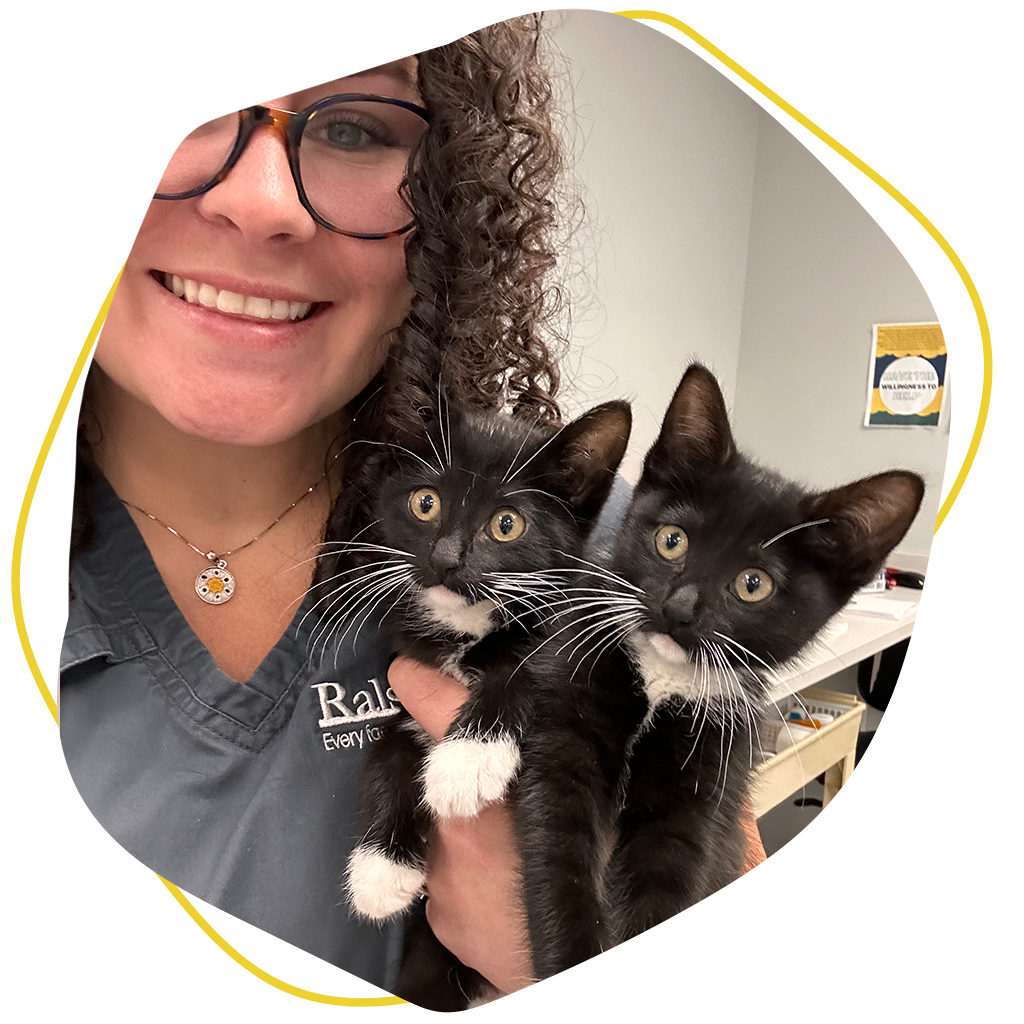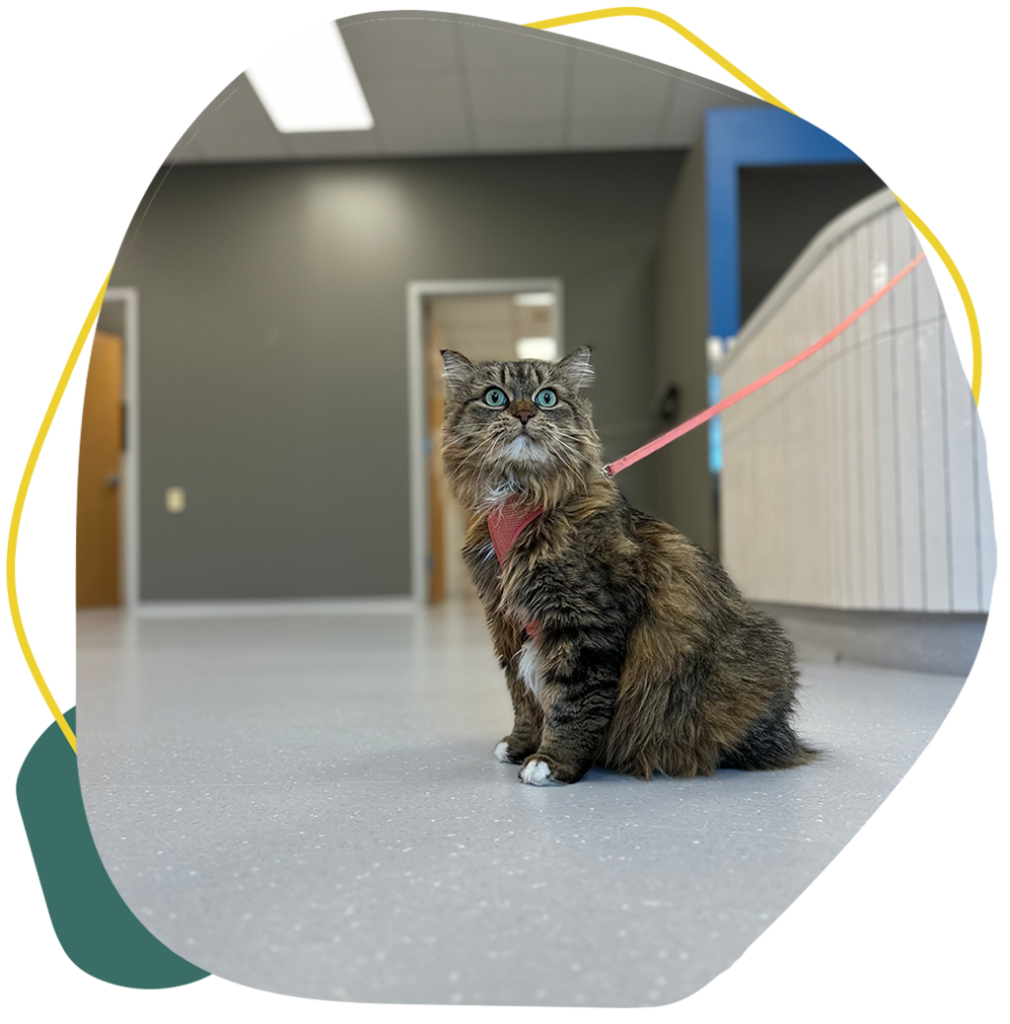Rabies Virus
A severe and fatal disease that causes neurological damage. Rabies can be transmitted to humans.


Protecting your new kitten from serious diseases begins with vaccinations. Even if your cat stays indoors, they can still be exposed to viruses carried in the air, dust, or on clothing. Vaccinating is the best way to safeguard your kitten from potentially life-threatening illnesses that can be costly to treat. The first series of core vaccines start around 8 weeks of age, with boosters given every 3-4 weeks until fully vaccinated. This vaccination process helps build antibodies in the blood, providing protection against infections. Once fully vaccinated, yearly exams and vaccine boosters are essential to keeping your cat protected and healthy for life.
A severe and fatal disease that causes neurological damage. Rabies can be transmitted to humans.
This virus is highly contagious and causes upper respiratory tract infection in cats. Symptoms include fever, ulcers and blisters on the tongue, and pneumonia. Treatment can be difficult, and even recovered cats can continue to infect others and experience chronic sneezing, runny eyes, and severe gum disease. Vaccination is tremendously important.
Feline distemper, caused by a highly resistant virus, is a potentially fatal disease. Vaccination is essential as infection rates can be as high as 90% to 100%. Symptoms include listlessness, diarrhea, vomiting, severe dehydration, fever, and death. The vaccine is highly effective in preventing the disease.
Feline Leukemia Virus can cause serious health problems for your cat, such as cancer and weakened immune system. Testing is available to determine if your cat has been infected, and vaccination is required if they are at risk of exposure.
Hookworms and Roundworms are common in kittens and, if untreated, can cause severe illness. Routine deworming during kittenhood, along with yearly stool exams, is recommended to check for these parasites, though intermittent shedding may not always show on exams. These parasites are zoonotic, meaning they can be transmitted to humans from pets. Proper hygiene, like washing hands after handling the litter box, can prevent transmission.
Both indoor and outdoor cats are at risk of heartworm infection, which is spread by mosquitoes. Even a small number of adult worms can cause severe disease in cats, including respiratory distress, heart, kidney, or liver failure, and can be fatal. There is no treatment for cats infected with heartworms, making year-round prevention crucial. Your veterinarian can help determine the best prevention product for your kitten.
Fleas and ticks carry infectious diseases that can cause illness in your kitten. Year-round flea and tick prevention is recommended to protect your pet, and your veterinarian can help you choose the right product for your family.
Pet insurance is a wise investment for pet owners who want to ensure their furry friends get the best possible health care. It can help protect your pet from unexpected accidents or illnesses and provide financial assistance for routine checkups, vaccinations, and even emergency surgeries. With pet insurance, you can rest assured that your pet’s health and well-being are taken care of without breaking the bank. Some pet insurance policies even offer coverage for alternative treatments like acupuncture or chiropractic care. When considering pet insurance, be sure to compare policies and read the fine print to choose the best plan for you and your pet’s needs. Please follow the link to help you find the best insurance for your pet.
https://www.pawlicy.com/
Recognizing the importance of making preventive care more accessible, we are pleased to offer Preventive Care Plans! These plans cater to pets at every life stage, from playful puppies & curious kittens to wise senior companions. By opting for our Care Plans, you can enjoy the convenience of affordable monthly payments, eliminating the stress of a hefty one-time expense. This way, you can work with our team to ensure your pets receive the best preventive care they need for a healthy and happy life! Our goal is to keep financial considerations from standing in the way of your family’s well-being. Follow this link for more information! https://ralstonvet.com/care-plans/
Spaying female cats involves surgical removal of the ovaries and uterus. This procedure has several advantages such as preventing pregnancy, elimination of heat cycles, and behavioral changes. As female cats get older, they have an increased risk of breast cancer and uterine infection if they are not spayed. It is recommended to discuss with your veterinarian about the appropriate age for spaying. As a general guideline, it is recommended to be performed after 6 months of age.
Neutering male cats involves surgical removal of the testicles. Neutering may help discourage aggression, hyperactivity, marking, roaming, and fighting. Neutering your male cat will eliminate the risk of testicular cancer and infection, as well as certain prostatic problems. It is recommended to discuss with your veterinarian about the appropriate age for neutering. As a general guideline, it is recommended to be performed after 6 months of age.
Microchipping your cat is a simple and effective way to ensure that you can find them if they ever get lost. A microchip is a tiny device, about the size of a grain of rice, that your vet can implant under your cat’s skin. It contains a unique identification number that can be read with a scanner. If your cat is ever lost and taken to a shelter or vet, they can scan the microchip to retrieve your contact information and quickly and safely reunite you with your cat. It’s important to keep your contact information up to date with the microchip company to ensure that you can be reached if your cat is found. Microchipping is a safe and painless procedure that can be done by your vet during a routine visit. It’s a small investment that can provide peace of mind and ensure that your furry friend is always protected. For more information, please follow the link. https://ralstonvet.com/microchipping/
Kittens have sharp toenails that can be trimmed with human fingernail clippers or with nail trimmers made specifically for dogs or cats. It is recommended to use nail trimmers made specifically for pets. Be cautious not to cut too much of the nail as it can cause bleeding and pain. With white or clear nails, you can see the pink quick through the nail. Use a sharp blade on your trimmers, as dull blades tend to crush the nail down and cause pain. Keep styptic powder available in case of bleeding. If you do not have styptic powder, you can use flour or cornstarch as a substitute to stop the bleeding.
Declawing should ONLY be considered after all other attempts have been made to prevent the cat from using its claws destructively or when clawing presents a significant health risk for people within the household. Before pursuing surgery, try frequent nail trimming, multiple scratching posts, and soft paws (soft nail caps that are glued on top of the nail). Declawing is a surgical procedure that involves the amputation of the third phalanx. A front declaw is preferred compared to an all-four paw declaw. It is best to declaw cats at the young age of about five months old. Young cats tend to recover more quickly and adapt better to the loss of their claws. This procedure can be painful and requires close monitoring for signs of pain as this potentially could lead to chronic pain. Cats that are declawed should be kept indoors only.
Spaying involves the surgical removal of the ovaries and uterus, preventing pregnancy, heat cycles, and behavioral changes. It’s recommended to spay cats at 5 months or older.
Neutering involves the surgical removal of the testicles and can help reduce aggression, hyperactivity, marking, roaming, and fighting. Neutering is often recommended at 5-6 months of age. Our team and doctors will discuss the process and benefits of neutering your cat.


If you have any questions or concerns, please don’t hesitate to contact us. We’re here to support you & your new kitten every step of the way. Feel free to explore more information on our site to ensure your pet receives the best care possible.
Kittens are naturally curious and will want to explore their new environment. To avoid overwhelming your kitten, it’s best to start by confining them to one room for the first few days, gradually expanding their access to the rest of the house. The ideal socialization period for cats is between 2 and 12 weeks of age, during which they are highly impressionable to social influences. Exposing your kitten to a variety of people, pets, and environments during this time will help them become well-adjusted adults.
Just as you would child-proof your house, kitten-proofing is essential. Keep wires, string-like objects, and plants out of reach. Provide appropriate chew items like a small pot of wheat grass or a fishing pole-type toy to channel their energy.
Stimulating play and having climbing perches available are key to meeting your kitten’s physical and mental needs. This also helps prevent unwanted behaviors like scratching furniture. Kittens naturally scratch to stretch their muscles, leave a scent, and groom their nails. Directing this behavior to appropriate items and locations, like scratching posts, is essential. Regularly trim your kitten’s nails and consider using artificial nail caps to manage unwanted scratching.
Most kittens are naturally drawn to litter boxes, but problems can arise if the box is not accessible, clean, or attractive. Daily scooping and routine washing are mandatory to maintain a clean litter box. In multi-cat households, there should be one more litter box than there are cats. For kittens struggling with litter box usage, restricting them to a smaller area with easy access to the box can help establish good habits.
Maintaining your kitten’s oral health is vital to their overall well-being. Poor oral hygiene can lead to infections and bacteria entering the bloodstream, potentially affecting vital organs like the heart and kidneys. Start a teeth-cleaning routine once your kitten is comfortable at home.
Our licensed veterinary technicians are happy to provide a tooth-brushing demonstration to help you get started!